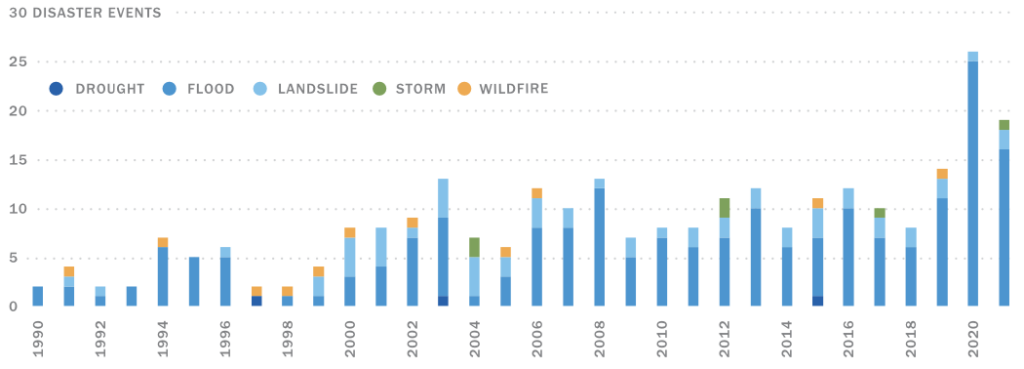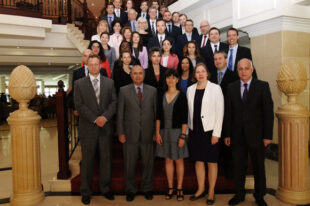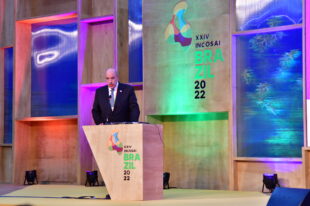BPK Audit: A Lighthouse Guiding Indonesia in Sailing the Ocean of Climate Crisis

Authors: Ahmad Adib Susilo, Muhammad Rafi Bakri, Ratna Wulandari
Introduction
According to the State of the Climate in Asia (2023) report, the average temperature of Asian countries in 2023 rose by 0.91 degrees Celsius compared to the period from 1991-2020. This results in a rise in sea surface temperature, which further intensifies tropical cyclones and severe rainfall that leads to floods and landslides. Indonesia has encountered a total of 300 natural disasters, including 200 instances of flooding between 1990 and 2021. These events have caused harm to around 11 million individuals. Figure 1 shows that all-natural disasters that happened in Indonesia were caused by climate change.
Figure 1. Climate-related Disasters

If this state is left to persist, it will result in unfavourable outcomes. Nationally, climate change leads to a decrease in agricultural productivity, hence undermining food security. In the event of food insecurity, there will be an uncontrolled surge in commodity prices. This will trigger a chain reaction that impacts both the national supply and demand, leading to economic instability (Ministry of Environment and Forestry of Indonesia, 2023).
To mitigate the effects of climate change, multiple stakeholders, including the Supreme Audit Institution (SAI), must be involved. The SAI has the capability to audit government initiatives aimed at preventing or mitigating the consequences of climate change. Both financial and performance audits can be conducted to support the government in reducing the impact of climate change.
BPK’s Commitment to Combating Climate Change
As an active member of INTOSAI, the Supreme Audit Institution (SAI) of Indonesia, or BPK, is committed to supporting sustainable development goals (SDGs) implementation, especially SDG 13 concerning the handling the climate change. In conducting SDG mapping, BPK refers to the implementation of INTOSAI-P 12 Value and Benefits of SAI, that the value and benefits of SAI are “making a difference to the lives of citizens”. BPK aligns its audit strategy to oversee the implementation of SDGs that have been integrated into the 2020-2024 Indonesia’s National Medium-Term Development Plan (NMTDP). BPK audits are expected to benefit the community, both directly and indirectly. BPK has outlined the audit plan and strategy in a BPK Strategic Plan 2020-2024.
BPK has adopted a dedicated audit strategy specifically designed to evaluate the processes and outcomes related to SDG targets. This strategy utilizes the INTOSAI Development Initiative’s (IDI’s) SDG Audit Model (ISAM), which enables BPK to conduct thorough audits of policies and programs that contribute to achieving nationally agreed SDG targets. Through these audits, BPK assesses the progress made toward achieving these targets. Figure 2 shows how BPK is committed to auditing climate change management.
Figure 2. BPK’s Strategic Plan Related to Climate Change

Performance Audit: Bolstering Hydrometeorological Disaster Risk Reduction Efforts
Assessing the disaster vulnerability in Indonesia is one of the responsibilities of the National Agency for Disaster Countermeasure (BNPB). BNPB publishes the Indonesian Disaster Risk Index to evaluate the possible impact of disasters in Indonesia. Regular evaluation of this risk index can serve as a monitoring and assessment tool for the successful implementation of disaster management strategies within a specific timeframe.
BNPB has implemented several schemes to establish an Early Warning System (EWS), a system designed to alert people of the occurrence of natural disasters or other indicators of natural events. Issuing an early alert to the community about a disaster involves disseminating information in a manner that is readily understandable to the community. To ensure optimal performance, the EWS must be appropriately administered holistically and inclusively, actively engaging the community and relevant stakeholders.
The review of the 2020-2024 BNPB’s plan document found that the aims and realization of the EWS in 2022 and 2023 were not reached, as indicated in the Figure 3 below. In 2022, BNPB targeted the creation of 6 EWS in several regions in Indonesia. However, BNPB was only able to realize 83.3%, or only 5 services. Furthermore, BNPB targeted the establishment of EWS in 11 locations in 2023. But, BNPB was only able to build the system in 2 locations.
Figure 3. EWS Plan and Realisation

To address this issue, BPK advises BNPB to evaluate the national risks associated with natural disasters and effectively coordinate risk assessments in all regions of Indonesia. BPK also requests that BNPB enhances its planning and budgeting controls to prevent any errors that may hinder its efficacy in mitigating hydrometeorological disasters.
Performance Audit: Climate Change Mitigation and Adaptation Initiatives in the Forestry and Other Land Use Sector
The forestry and other land use (FOLU) industry is the second-greatest contributor to greenhouse gas (GHG) emissions in Indonesia, following the energy sector. According to the BPK’s Audit Report (2024), the FOLU sector accounted for 249.71 million tons of carbon dioxide (CO2E) or 21.89% of total CO2E in 2022.
Figure 4. National Greenhouse Gas Emissions 2000-2022

Management of greenhouse gas emissions is essential to mitigate climate change. Indonesia, under the auspices of the Ministry of Environment and Forestry, has affirmed its dedication to climate change mitigation and adaptation by instituting the national priority of “Building the Environment, Increasing Disaster Resilience, and Climate Change” in the 2020-2024 NMTDP, aligning with the Paris Agreement and the Sustainable Development Goals.
BPK has performed a performance audit to evaluate the government’s initiatives in climate change mitigation and adaptation within the forestry sector and other land uses from the 2021 fiscal year through the first half of 2023. This audit encompasses programs related to mitigate deforestation, rehabilitate forests and land, and finance climate change handling.
The audit results indicate that the reduction in deforestation rates has not aligned with its plans, and its impact on emission reduction remains unquantified. The Ministry of Environment and Forestry has been unable to distinguish between intentional and unintentional deforestation. The audit of deforestation is conducted using satellite image analysis of land cover, which cannot ascertain the underlying causes of changes in land cover. Furthermore, the outcomes of Forest and Land Rehabilitation (RHL) initiatives have failed to determine their impact on climate change mitigation. The outcomes of RHL planting initiatives remain low, fluctuating between 0.88% and 20.55% reforestation, with an average of 8.64%. A comprehensive comparison is presented in Table 1.
Table 1. Comparison of Realized RHL Area with Land Cover 2013-2017 (ha)
| Year | RHL Realization | Land Cover in RHL Location | % Reforestation | ||
| Vegetative | Mangrove | Total | |||
| a | b | c | d=b+c | e | f=e/d |
| 2013 | 22,015 | 22,015 | 3,145 | 14.29% | |
| 2014 | 5,415 | 5,415 | 399 | 7.37% | |
| 2015 | 18,132 | 481 | 186,613 | 164 | 0.88% |
| 2016 | 20,483 | 497 | 20,980 | 4,312 | 20.55% |
| 2017 | 35,357 | 1,175 | 36,532 | 932 | 2.55% |
| 101,402 | 2,153 | 103,555 | 8,952 | 8.64% | |
Moreover, financing from non-state budget sources, like carbon markets and result-based payments, are not reliable. Forecasting funding from carbon trading is now unfeasible, as the economic potential of carbon trading in the forestry industry has not been assessed, as the revision of Government Regulation 12/2014 is still on progress. Moreover, result-based payments have not been effectively realized, utilized, or monitored since the attainment of GHG emission reductions of 577,499,160 tons of CO2E has not received.
BPK recommends that the Ministry of Environment and Forestry establish standards for measuring and evaluating deforestation reduction efforts, distinguishing between intentional and unintentional deforestation as climate change mitigation strategies, and aligning deforestation targets within the FOLU Net Sink at national and subnational levels.
In addition, BPK advises the Ministry to prepare standards for assessing the efficacy of RHL activities. It urges the Ministry of Home Affairs regarding the authority and responsibility of Forest Management Units (KPH) in maintaining RHL activity outcomes. Last, it emphasizes the need for collaboration with all stakeholders to identify and mobilize funding sources from the state budget and Non-state budget to assist climate change mitigation programs.
Conclusion
BPK is dedicated to facilitating the execution of the Sustainable Development Goals, which encompass climate change. In doing SDG mapping, BPK adheres to the principles outlined in INTOSAI-P 12 regarding the Value and advantages of SAI, which state that the value and advantages of SAI consist of “making a difference to the lives of citizens.” BPK aligns its audit strategy to monitor the execution of SDGs incorporated into the 2020-2024 National Medium-Term Development Plan.
BPK has emerged as a beacon of hope in the fight against climate change, delivering recommendations with the precision of a lighthouse guiding ships through stormy seas. BPK’s insightful and actionable recommendation is not just a roadmap but a transformative force, illuminating the way to timely and effective climate action. Through BPK’s visionary contributions, Indonesia is poised to navigate the turbulent waters of environmental challenges with newfound clarity and resolve.
In closing, BPK must expand its climate change audits and boost its capabilities to effectively guide Indonesia’s climate action programs. Strengthening these areas will ensure BPK remains a vital force in driving the nation’s progress and achieving impactful climate solutions.
About the Authors
Ahmad Adib Susilo is a Senior Advisor in Environmental and Sustainable Development. He holds a Master’s degree in Computation from the University of Manchester. He has decades of expertise with BPK audits at the central and regional government levels.
Muhammad Rafi Bakri is a graduate of the Polytechnic of State Finance STAN. Now, he is a Data and Finance Analyst at the Secretariat of the Senior Advisor for Environment and Sustainable Development, where his role is to assist the Senior Advisor in further researching environmental issues, SDGs, and its application to auditing.
Ratna Wulandari is currently serves as an Auditor at the Audit Board of Indonesia (BPK). She is an alumnus of the Polytechnic of State Finance STAN in the Accounting Study Program and continued her Bachelor of Accounting education at the Universitas Terbuka. She earned a professional accountant degree from Hasanuddin University in 2023.





